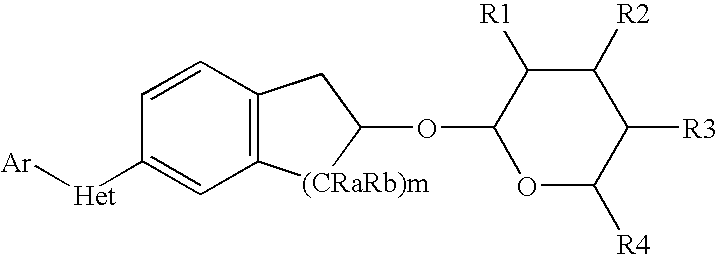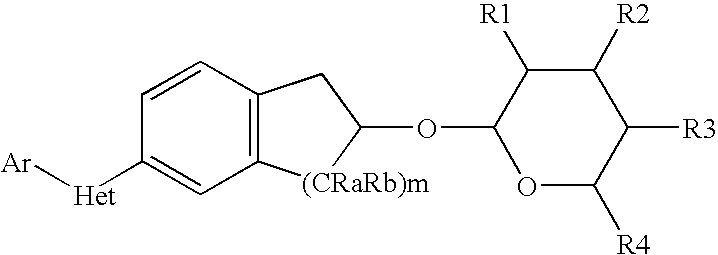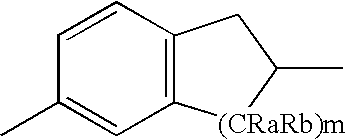Pesticidal compositions
a technology of compositions and pesticides, applied in the field of pesticide compositions, can solve the problems of billions of u.s. dollars in agricultural losses, millions of human deaths around the world, and the loss of agricultur
- Summary
- Abstract
- Description
- Claims
- Application Information
AI Technical Summary
Benefits of technology
Problems solved by technology
Method used
Image
Examples
example 1
Preparation of (3R,4R,5S,6S)-2,3,4,5-tetramethoxy-6-methyl-tetrahydropyran (Compound E-1)
[0057]
[0058]A solution of L-rhamnose hydrate (40 grams (g), 0.22 mole (mol)) in dry dimethyl sulfoxide (DMSO; 450 milliliters (mL)) was placed in a 2-liter (L) 3-neck round bottom flask and stirred mechanically while powdered potassium hydroxide (KOH; 75 g, 1.34 mol) was added in one portion. Iodomethane (187 g, 1.32 mol) was added to this solution at a rate such that the temperature of the solution was maintained below 30° C. A dry ice-acetone bath was used intermittently to maintain this temperature. After the addition was complete (about 2 hours (h)), the solution was stirred an additional 3 h, then it was allowed to stand at ambient temperature overnight. This clear solution was then extracted with hexanes (4×500 mL), and the combined hexane solution was washed with brine before drying and evaporation of solvent to provide a light orange solution (44 g, 92%). Distillation gave 40 g of a colo...
example 2
Preparation of (3R,4R,5S,6S)-3,4,5-trimethoxy-6-methyl-tetrahydropyran-2-ol (Compound E-2)
[0059]
[0060]A solution of E-1 (35.7 g, 0.162 mol) in 2 N hydrochloric acid (HCl; 300 mL) was heated at 98° C. for 5 h, was then cooled to room temperature, and was extracted with dichloromethane (CH2Cl2; 4×170 mL). The combined extracts were dried over magnesium sulfate (MgSO4) and decolorized with charcoal. Concentration gave the title compound (24.7 g, 74%) as a viscous oil. A portion of the crude product (960 milligrams (mg)) was vacuum distilled using a Kuhgelrohr apparatus collecting 890 mg at 145-155° C. (1-2 mm).
example 3
Preparation of (3R,4R,5S,6S)-4-ethoxy-2,3,5-trimethoxy-6-methyl-tetrahydropyran (Compound E-3)
[0061]
[0062]Sulfuric acid (H2SO4, 98%; 300 mL, 5.6 mol) was added slowly to a stirred solution of methyl alcohol (2.5 L) in a 4-L Erlenmeyer flask. When the solution had cooled to ambient temperature, 3′-OEt spinosyn J / L (350 g, 0.47 mol prepared as in DeAmicis et al., U.S. Pat. No. 6,001,981, 1999) was added and the resulting solution was heated at reflux for 6 h. The cooled solution was transferred to a 4-L separatory funnel and extracted with hexanes (3×1 L). The combined organic solution was dried, concentrated in vacuo, and then distilled using a Kugelrohr apparatus to provide a colorless oil (65 g, 60%), by 165° C. (10 mTorr).
[0063]Compounds E-3 through E-22 were made in accordance with the procedures described above and illustrated in Examples 1-3. These compounds are listed in Table 1.
PUM
| Property | Measurement | Unit |
|---|---|---|
| temperature | aaaaa | aaaaa |
| temperature | aaaaa | aaaaa |
| temperature | aaaaa | aaaaa |
Abstract
Description
Claims
Application Information
 Login to View More
Login to View More - R&D
- Intellectual Property
- Life Sciences
- Materials
- Tech Scout
- Unparalleled Data Quality
- Higher Quality Content
- 60% Fewer Hallucinations
Browse by: Latest US Patents, China's latest patents, Technical Efficacy Thesaurus, Application Domain, Technology Topic, Popular Technical Reports.
© 2025 PatSnap. All rights reserved.Legal|Privacy policy|Modern Slavery Act Transparency Statement|Sitemap|About US| Contact US: help@patsnap.com



